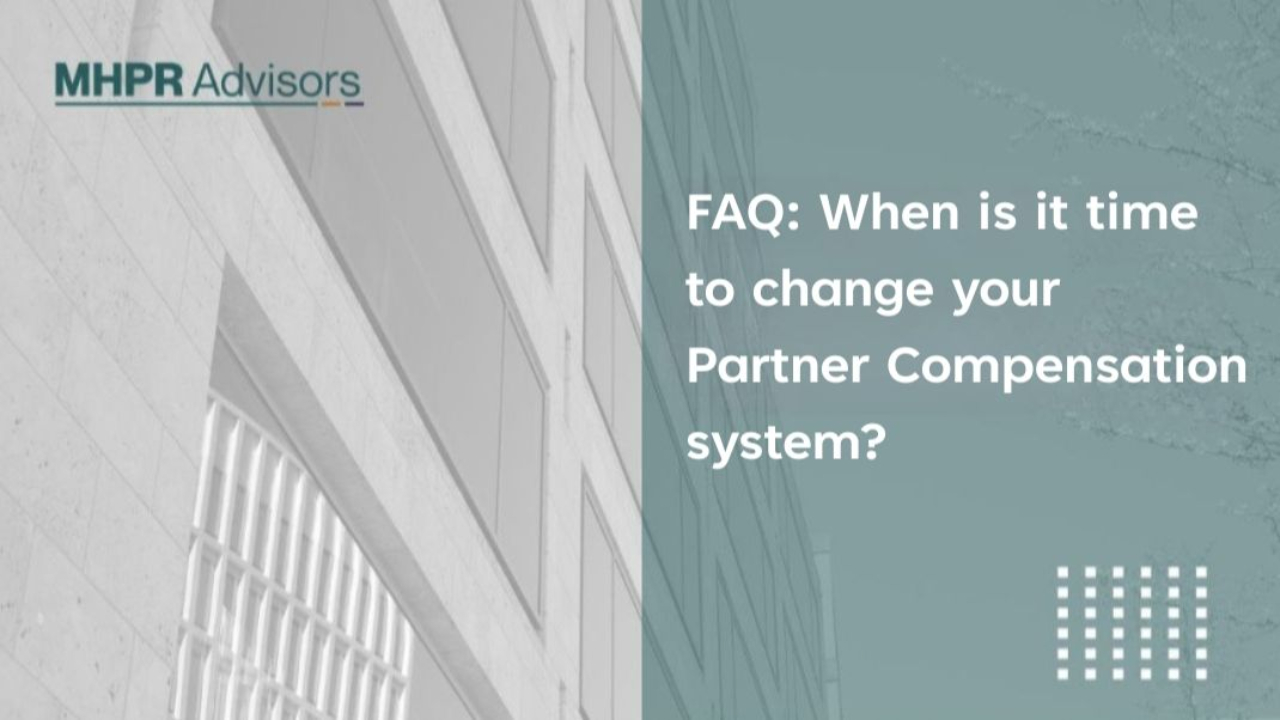
FAQ: When is it time to change your Partner Compensation system?
Author: Michael Roch,Lead author, The Partner Remuneration Handbook (2022)
Recently, a client told me "changing the partner compensation system is difficult so we've decided to deploy it to its limits before contemplating significant changes." This sparked a conversation, which I thought was worth sharing as I know others grapple with the same issue.
Why do firms fear changing their partner compensation system?
It's true that many firms do not exhaust the current scope of their existing partner compensation system its fullest extent. However, during hard times, the firm's leadership often will be tempted to contort an existing system to achieve a result it wants to achieve. This reduces all remaining partners’ trust in the system at the price of resolving one case. Using a compensation system that no longer reflects the partnership's size and maturity exacerbates this problem.
Often leadership teams don’t want to touch their firm's partner compensation system because political ghosts, carefully locked away in the closet when profits are rising, come out. Sometimes these fears turn out to be real, yet often firm leaders overestimate the risks of potential problems of changing the system. This is especially true when a compensation system hasn't continuously evolved with the partnership – ghosts long thought gone have a habit of reappearing.
Why change the partner compensation system?
In 90 percent of all partner compensation enquiries and RFPs I receive, the partner opinion building process is either non-existent, poorly designed or set up for poor execution. Many firm leaders jump immediately into the solution, i.e. what they wish to change. Yet often the “why change this?” aspect is missing completely - the energy required to meticulously build, communicate, discuss and agree the need for change.
Often changing the partner compensation system becomes difficult because well-meaning leadership (often the CFOs) have applied band-aids over time without having a view of the cumulative effect. While leadership teams rightfully want to minimize the time partners spend on "internal" work, a balance is needed - the best system is co-created or co-evolved together with the partners who will live under the future system.
When is it time to change the partner compensation system?
To be clear, I am not advocating changing a partner compensation system for the sake of change. Yet often the mountain to climb is made out to be much bigger than it actually is (especially – and sorry for the plug – when the process is expertly supported).
Change your partner compensation system when it has outgrown the number of partners (equity and non-equity partners) or when it has outgrown the maturity of the firm. A health check could be appropriate after a strategy change or change in firm leadership. This is to ensure the compensation system supports evolved objectives and new leadership approaches to galvanizing, developing, motivating, and mobilizing partners into contributing for the benefit of the whole.
How to change the partner compensation system
My methodology starts with me spending a lot of time upfront with the leadership team to carefully balance the substance (what needs changing, why and how) with the process (how to involve the partnership in the evolution). This is my process:
Look at the “why” in some depth – often the real problem is somewhere else
Segregate the problem and possible solution into their three main elements (financial reward structure, contribution management and decision-making - ask me for a one-pager on this)
Prioritize those changes that would make the biggest difference to the firm / the problem to be solved
- Design the opinion building process reflecting the size and maturity of the partnership, the size and capabilities of the leadership team and the political situation in the partnership
- Separate the firm, the compensation system and the individuals (harder said than done, I know)
- Guide the required changes together with the leadership team, from design to complete implementation
In my experience, this approach increases both success rate and acceptance of change exponentially.
Thinking about changing the partner compensation system? Let me be your sounding board. Contact me for confidential discussion and let's explore the options.




